|
|
|
Sort Order |
|
|
|
Items / Page
|
|
|
|
|
|
|
| Srl | Item |
| 1 |
ID:
118805
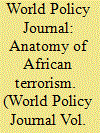

|
|
|
| 2 |
ID:
118802
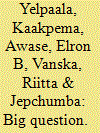

|
|
|
|
|
| Publication |
2012.
|
| Summary/Abstract |
Technology is the touchstone of development. Acquiring advanced technologies helped boot-strap China and India out of the economic doldrums in a generation. Across Europe and North America, it's maintained the West's economic, social, cultural, political, and military leadership. Yet for decades, Africa was perceived as having been left behind. Now, as mobile technology spreads across Africa, innovative ways of using technology are transforming almost every sector of life. We have asked our panel of global experts to weigh in on what role technology should play in the development of Africa.
|
|
|
|
|
|
|
|
|
|
|
|
|
|
|
|
| 3 |
ID:
118809


|
|
|
|
|
| Publication |
2012.
|
| Summary/Abstract |
Port Harcourt, Nigeria-It was a cool afternoon on November 10, 1995, in the Bundu Waterside area of Port Harcourt in southern Nigeria. In the local prison, the Ogoni environmental rights activist Kenule Saro-Wiwa sat awaiting execution. He had already been detained for a year, charged with murdering four Ogoni leaders. The charges were spurious. The four had actually died during a protest against oil pollution and government neglect. Saro-Wiwa had been caught between the demonstrators and heavily armed police-the real killers of the Ogoni four.
|
|
|
|
|
|
|
|
|
|
|
|
|
|
|
|
| 4 |
ID:
118810
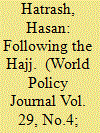

|
|
|
| 5 |
ID:
118806
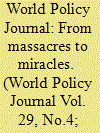

|
|
|
|
|
| Publication |
2012.
|
| Summary/Abstract |
For the past 12 years, President Paul Kagame has ruled Rwanda with a firm hand, stabilizing a country that was torn apart by genocide only 18-years ago. Nevertheless, his opponents say his rule has come at a cost-harassment of journalists, politically motivated killings, and a crackdown on human rights defenders. Above all, Kagame has been accused of supporting a violent rebel insurgency in eastern Congo, a charge he repeatedly and vehemently denies.
|
|
|
|
|
|
|
|
|
|
|
|
|
|
|
|
| 6 |
ID:
118814
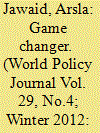

|
|
|
|
|
| Publication |
2012.
|
| Summary/Abstract |
Karachi, Pakistan-Green and red flags line the streets. The crowd snarls traffic across the city as an estimated 150,000 young Pakistanis fill the roads and alleys to the Quaid Mausoleum-the final resting place of Pakistan's founder, Quaid-i-Azam Mohammad Ali Jinnah. Unlike the often tumultuous religious or ethnic processions here, this march is peaceful, albeit with ferocious patriotism and boisterous chants of "Yes, We Khan." Superstar cricketer-turned-philanthropist-turned-politician Imran Khan is holding a rally in Pakistan's port city of Karachi, the country's economic hub. Khan's rallies are bigger, louder, and younger than those of any other Pakistani politician. In the days leading up to this grand event, his party's computers robo-called 300,000 local phones with a simple, direct message: "Assalam-o-Alaikum. This is Imran Khan speaking. How are you? I am coming to your city to bring everyone together on December 25 at Mazar-e-Quaid for a peace rally. I hope that you can break all the shackles and take part, because at this rally, we need to make the beginnings of a new Pakistan. I will be waiting. Thank you." It was a wake-up call, doing more to convince people to attend than billboards and posters prone to vandalism. Khan drew crowds from a cross-section of Pakistani society, from the slums of Karachi to the most elite areas.
|
|
|
|
|
|
|
|
|
|
|
|
|
|
|
|
| 7 |
ID:
118811
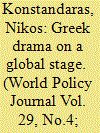

|
|
|
|
|
| Publication |
2012.
|
| Summary/Abstract |
Athens-Greece's deepest wounds are not the ones appearing on the world's television screens. It's not the neo-Nazi thugs ambushing migrants, hooded youths clashing with police, or the spreading decay of crumbling buildings and abandoned stores. The greater damage lies beneath the surface. It's the silent despair of pensioners who cannot pay their utility bills but try to support younger, unemployed family members; the many Greeks who, by losing their jobs, lose their social security and are forced to rely on charity for food and health care. Just three years ago, our society was proud to take care of its citizens, immigrants, and visitors. Everyone was on the national health plan; even injured tourists received full treatment with no charge and no questions asked. Now, the safety net has been withdrawn-just as we need it most.
|
|
|
|
|
|
|
|
|
|
|
|
|
|
|
|
| 8 |
ID:
118803


|
|
|
|
|
| Publication |
2012.
|
| Summary/Abstract |
A
cross Africa, deep beneath a host
of varied terrains, vast groundwater reserves lie almost untouched.
These aquifers are some 410,000 cubic
miles thick and contain 100 times the
freshwater that exists on the continent's
surface. As Africa's population expands,
these aquifers could prove critical in
increasing food production, reducing
poverty, and adapting to climate change.
|
|
|
|
|
|
|
|
|
|
|
|
|
|
|
|
| 9 |
ID:
118815
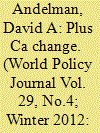

|
|
|
|
|
| Publication |
2012.
|
| Summary/Abstract |
Paris-The first meal I ever had in France was in a small bistro on the rue de Caumartin just down the street from No. 37-the office that served for half a century as the Paris bureau of The New York Times. It was to this bureau that Timesmen returned as the Allies re-took Paris at the end of World War II, astonished that it was still much as they'd left it when the Nazis had first rolled into town. As for myself, my arrival took place a quarter-century later-September 7, 1969. I'd just touched down in Paris, for my first visit, on an Air India flight from New York. When I exited the subway at the Havre-Caumartin stop, the streets were as quiet as central Paris can only get on a lazy Sunday afternoon, barely a week after "le grand retour" brought the hordes back from their August vacances to the real world. The Times' bureau was shifting into high gear, churning out copy for the next day's editions. My new boss, Seymour Topping, then foreign editor, had warned bureau chief Henry Tanner that his news assistant would be pitching up there and to treat him right. So with Tanner's door closed as he crafted his story, the curmudgeonly reporter John Hess suggested I duck down the block to a little bistro and have a bite until Tanner was free to begin the process of inculcating me in the French way of life. So I did. I ordered "un hot dog" and was taken aback as they served me a long, grilled dog smothered with melted cheese. Not likely something they'd have served up at Fenway Park.
|
|
|
|
|
|
|
|
|
|
|
|
|
|
|
|
| 10 |
ID:
118813


|
|
|
|
|
| Publication |
2012.
|
| Summary/Abstract |
London-On October 5, lawyer Martyn Day walked out the front door of London's High Court to greet a throng of ravenous reporters gathered outside. He was there to tell them what they were hungry to hear-that the British Empire is now on trial. Earlier that day, the court ruled that three elderly Kenyans who were tortured and abused by British colonial officers in the 1950s can move forward with their claims against the British government. In dismissing the objections of the UK Foreign and Commonwealth Office (FCO) that today's Britain is not to blame for the wrongs of its colonial forebears and that too much time has elapsed for a fair trial, the High Court removed the claimants' last barrier. The case can now go to trial. For the first time, colonial victims can sue the British state.
|
|
|
|
|
|
|
|
|
|
|
|
|
|
|
|
| 11 |
ID:
118812


|
|
|
|
|
| Publication |
2012.
|
| Summary/Abstract |
North Kivu province in Democratic Republic of the Congo, near the border with Uganda and Rwanda, has been soaked in blood for more than a decade. Hutu and Tutsi armies led by warlords armed with guns and bullets fight over territory and access to natural resources. Anti-government Tutsi rebels have displaced at least 500,000 civilians and slaughtered thousands of women and children. On November 4 and 5 of 2008, at least 150 civilians died in one such attack on the village of Kiwanja.
|
|
|
|
|
|
|
|
|
|
|
|
|
|
|
|
| 12 |
ID:
118808
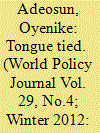

|
|
|
|
|
| Publication |
2012.
|
| Summary/Abstract |
Lagos-In her song "One Kilometer, One Language," Nigerian pop star Evi Edna Ogholi captures Africa's linguistic complexity. In pidgin English, she raps, "One kilometer means another language, half a kilometer means another language … na which one we go speak?" According to a 2010 UNESCO report, the number of indigenous languages in Africa ranges from 1,000 to 2,500. After the 19th century scramble for Africa, colonial governments also overlaid three other languages-the English that became dominant in West and East Africa, the French of West and Central Africa, and the Portuguese spoken mainly in southern Africa. Post-independence Africa is still tied to these languages. Though there have been calls for the promotion of indigenous languages, the reality on the ground may force African countries to rethink their language policy, and by implication, their entire economic, social, and cultural environment.
|
|
|
|
|
|
|
|
|
|
|
|
|
|
|
|
| 13 |
ID:
118807
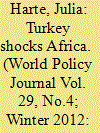

|
|
|
|
|
| Publication |
2012.
|
| Summary/Abstract |
Istanbul-Late one August night in 2011, Rifat Saricaoglu, the head of Turkey's association of private universities, received a call from the office of the prime minister. Saricaoglu had three hours to gather as many university scholarship pledges for Somali students as possible. Prime Minister Recep Tayyip Erdogan was about to fly to Mogadishu, making the first visit to Somalia by a non-African head of state since the country's last effective government was ousted in 1991, and Erdogan wanted to present a momentous gift.
|
|
|
|
|
|
|
|
|
|
|
|
|
|
|
|
| 14 |
ID:
118804


|
|
|
|
|
| Publication |
2012.
|
| Summary/Abstract |
E
mmanuel Jal is a child soldier gone
right. Through his music and charitable work, he works tirelessly to
help his beleaguered new nation of South
Sudan and to prevent another genocide
by recruiting "peace soldiers" around the
globe to speak out against violence. Born
in the heart of one of the most violent corners of the world-southern Sudan-he
followed his father into the civil war that
broke out in 1983 when he was just three
years old. At seven, his mother was slain
by government soldiers, and, together
with thousands of other children, Emmanuel set off on a tortuous path south to what
he hoped would be safety in Ethiopia.
|
|
|
|
|
|
|
|
|
|
|
|
|
|
|
|
|
|
|
|
|